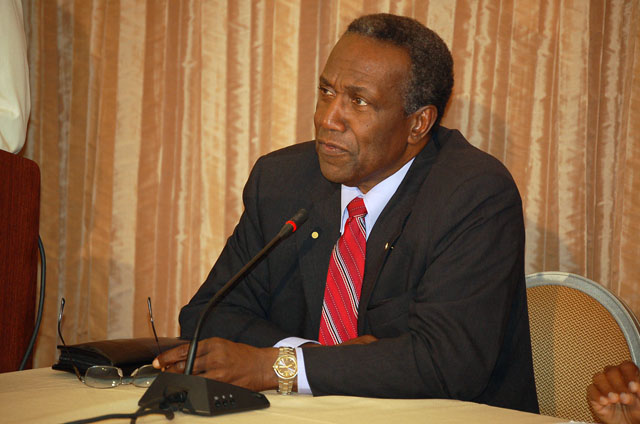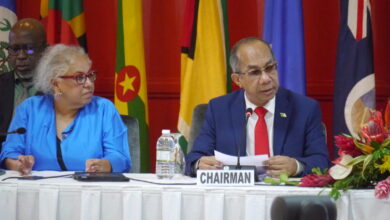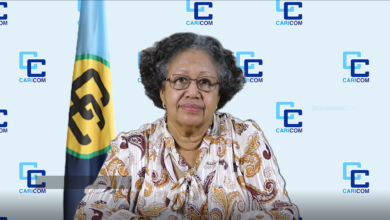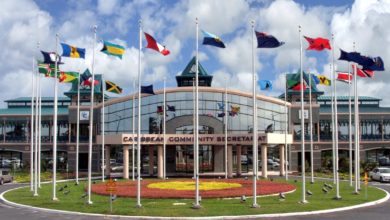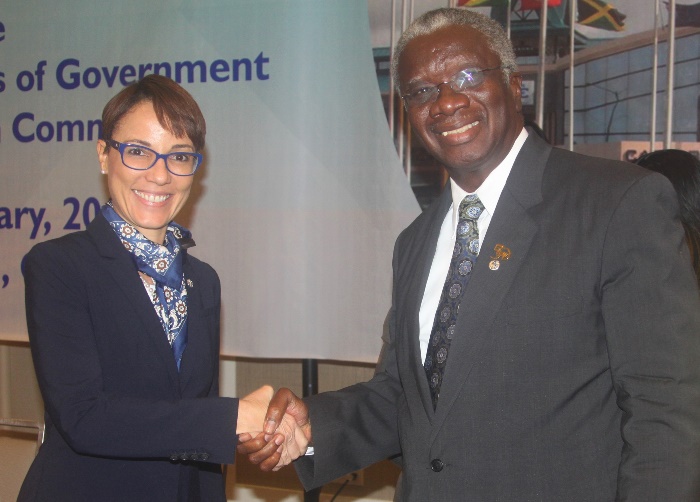It is my pleasure, as Secretary-General of the Caribbean Community, to be in Antigua and Barbuda and to join in greeting you all on behalf of the Caribbean Community Secretariat and indeed of the entire Community.
This meeting comes at a very hectic period for me and the Secretariat, as we are in the process of preparing for the 31st Meeting of the Conference of Heads of Government, which takes place in Montego Bay, Jamaica in just over a week’s time from 4th to 7th July.
We have been preoccupied with efforts towards the reconstruction of Haiti. There have also been a number of other meetings that have engaged the Secretariat and our Governments within the past few weeks, including the special meeting with the US Secretary of State Hilary Clinton in Barbados, the Joint CARICOM/US Forum on the Caribbean Basin Security Initiative in Washington DC, and my own briefing with the new Prime Minister of Trinidad and Tobago, the Hon. Kamla Persad Bissessar who now assumes the portfolio of Lead Head of Government for Crime and Security in the Quasi-Cabinet of the Caribbean Community.
Hon. Ministers, distinguished delegates, ladies and gentlemen, the Community has accorded a very important role to the issue of crime and security. It is for this reason that Security has been elevated to being the fourth pillar of the Community alongside trade and economic integration, foreign and community relations and functional cooperation. Consequently, this brings increased importance and challenges to this Council to streamline the crime and security programmes and to make the new management structure for crime and security function more effectively.
The discussions in which we are engaged at this 10th CONSLE are most important. They are intended to help us to focus on several operational matters for which critical and concrete decisions can no longer be delayed. Among these are how to strengthen the interface between the regional and national crime and security programmes and in what ways are the programmes from the coordinating and implementation agencies such as IMPACS and SEPACS to be streamlined, to guarantee a safe and secure regional environment.
In this regard it is important to recognise that the legacies of Cricket World Cup 2007 such as the introduction of the advanced passenger information system, and the operations of the single domestic space, are important features on which we must build the viability of our regional integration movement. These legacies among others facilitated a common visa policy and free movement of persons and demonstrated the benefits of pursuing common policies. Indeed the CWC 2007 legacies illustrate the best features of functional cooperation. They contribute to the economic viability of our Region by underpinning the sustainability of the CARICOM Single Market arrangements.
In that context, I look forward to the discussions on the operational guidelines, the concerns and the financial options for the implementation of the CARICOM Travel Pass project (CARIPASS) which offers a very exciting prospect for utilising the newer information technologies to facilitate easier passage of CARICOM nationals through the immigration process, while at the same time offering to make our borders much more secure by providing comprehensive checks and balances. The prospects are awesome. While other countries like the UK, Singapore, Canada and the Cayman Islands have put in place various electronic devices that contribute toward radically revamping their immigration processes, none so far, has had to face the challenge of operating a cross border system among as many as 12 sovereign States that form part of the Caribbean Community. I therefore expect a very robust debate on this issue.
We are also confronted with the results of the recently concluded Caribbean – United States Security Cooperation Co-operation Dialogue, as set out in the Declaration of Principles which emanated from that dialogue and which provides a valuable launching pad for consolidating the relationship with the USA on a series of mutually beneficial security activities.
Two issues in the cooperation with the US that resonate are human safety and social justice. It is significant that these two features form an essential basis for the links between the CARICOM Secretariat, as a coordinating organisation for the Community, and IMPACS as an implementing agency. It is for this reason that the current project with UNODC for crime prevention which includes reducing the demand for illicit drugs, will prove to be pivotal in mainstreaming crime prevention into human and social programmes such as health, education, youth, culture and gender, as well as the justification for budgetary allocations to facilitate these developments.
Hence the reason today for the Agenda Item that addresses the need for the establishment and implementation of a Regional Resource Mobilisation Framework for crime and security. That structure must provide an opportunity for helping the Region to define its priorities more concretely and to lay the foundations for creating sustainable partnerships, to implement an agenda that must include institutional strengthening, capacity building, border security and enhanced information and communication systems.
In the final analysis the outcomes from the deliberations at this meeting must place emphasis on making our CARICOM Single Market a zone of peace, one that would, among other things, continue to attract visitors to our shores and one that demonstrates to the world what can be achieved by small countries working together, to be competitive in the global arena. Mr. Chairman, Hon. Ministers, distinguished delegates, ladies and gentlemen, our people expect us to secure their future. Let us therefore take on the challenge and make this Caribbean Community a safer and thus a better place, not only for all its citizens, but for all who dwell therein.
I thank you.

